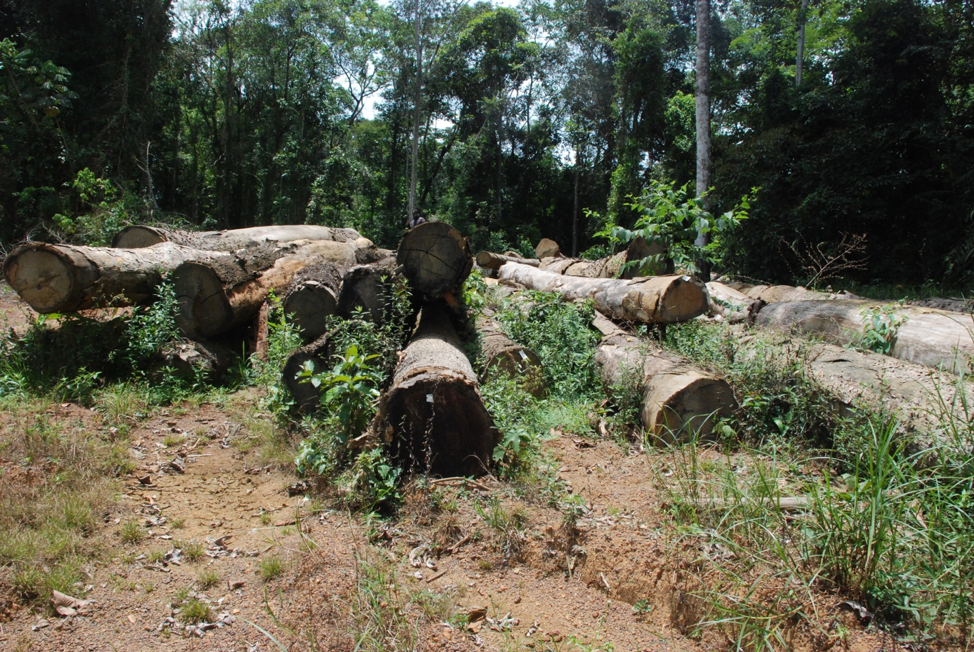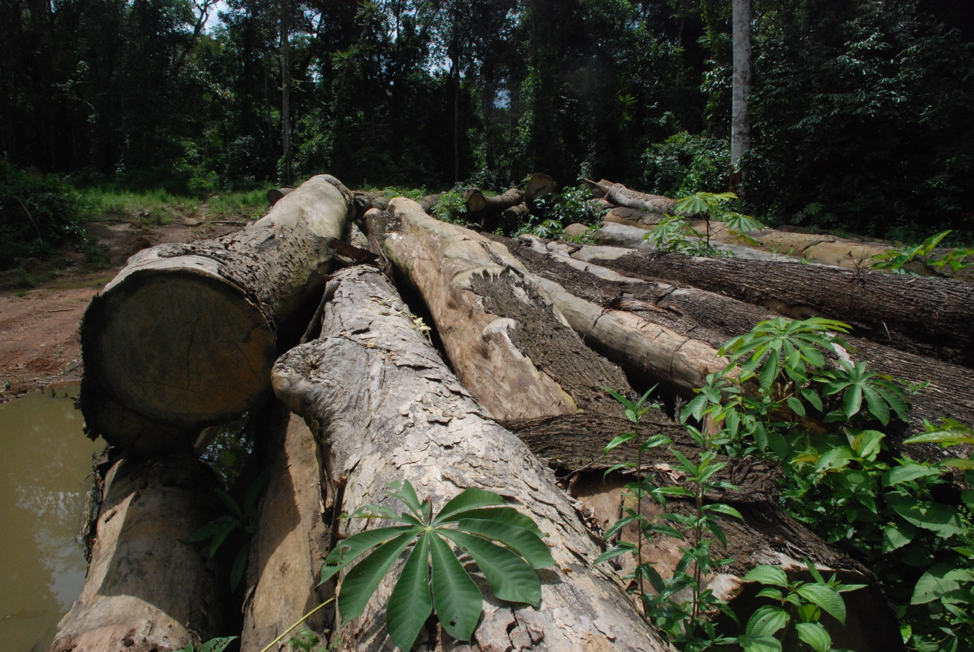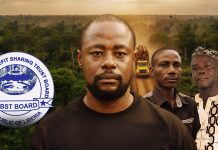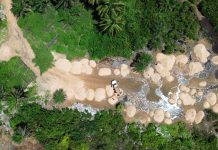Top: Some of the logs forestry authorities say African Wood & Lumber illegally harvested. The DayLight/Emmanuel Sherman
By Emmanuel Sherman
NYORWEIN – On a sunny day in December 2020 while patrolling the Gbarsaw and Dorbor Community Forest in River Cess County, Yei Neagor overheard the sound of a chainsaw. She was shocked because, as the contract administrator of the Forestry Development Authority (FDA) in the south-central county, she must have been aware if there were any legal logging operations there.
“It could be illicit small-scale loggers,” she said to herself. Or a logging company conducting an illegal operation.”
So, Neagor quickly hired a motorcycle taxi-rider and headed into the 21,230-hectare dusky woodland in the Nyorwein District forest to investigate. It turned out the loggers were from the African Wood & Lumber Company. It had signed a five-year agreement with Gbarsaw & Dorbor a year ago but did not obtain the FDA’s approval to harvest logs.
Three months after her investigation, Neagor ordered the men to stop and filed a report to the agency’s office in Buchanan, Grand Bassa, responsible for that region. The company has not resumed work ever since.
But the damage had already been done. Neagor would find out seven months later that African Wood had harvested 550 logs in the forest that still remain there today. News of the illegal harvesting comes just over a week after an investigation by The DayLight found an estimated US$2.2 million worth of logs were unlawfully extracted outside a community forest in Lofa County.
“They got some in the forest only a few pieces they have by the roadside,” Neagor told The DayLight in a mobile interview.
This reporter saw some of the logs not far from a footpath but did not reach the rest of the woods due to the inaccessibility of roads in that area at this time of the year.
African Wood’s illegal harvesting breaks the National Forestry Reform Law and the Code of Harvesting Practices. The legal frameworks require the company to first obtain a five-year plan and an annual operation plan, and a harvesting certificate before felling a single tree. In normal forestry practice, the five-year and annual operation plans are meant to guide a company’s harvesting. They provide scientific information on where and how loggers can cut trees, among other things. A harvesting certificate authorizes the company’s operations.

Both the law and code were created to help Liberia sustainably manage its forest, the largest remaining rainforest in the West African region. In 2006, the country has made a commitment to conserve 30 percent of its forest. Last year, it promised to halve its deforestation rate by 2030. It, however, lost 128,000 hectares of natural forest last year alone, according to Global Forest Watch, which tracks deforestation worldwide.
Gbarsaw & Dorbor reflects that grim picture. It lost 420 tree covers in 2017, according to a study by the FDA and the World Resource Institute, a global research nonprofit. Tree cover loss is the removal of tree canopy by people and nature, including bushfires.
No Punishment
There are no records that show the FDA has punished the company as mandated by law. James Flomo, FDA’s representative responsible for River Cess, Bassa and Nimba, had informed the institution’s headquarters in Paynesville about the illegal harvesting as early as September last year, according to a report he compiled on the matter at the time.
“We are still working on that but the immediate action was to put stop to the company. As we speak that not working and they are not allowed to work,” Flomo said. “Any other penalties that will come out as a result of the investigation will be reported in subsequent time.”
Mike Doryen, the Managing Director of the FDA, said he would get back to The DayLight this week. We will update the story once he does that. The FDA is yet to take legal actions against Sing Africa, the Singaporean company that harvested over 5,500 logs outside its concession in the Bluyeama Community Forest in the Zorzor District.
Unauthorized harvesting is an offense in forestry whether “intentionally or negligently.” African Wood is required to pay a fine of twice the total value of the volume of each species of logs illegally harvested as per the world market prices, according to Regulation 118-17 on Confiscated Logs, Timber and Timber Products. It was created in 2017 to compel companies to comply with logging legalities.
The FDA is required to obtain a court order to confiscate and auction the logs but it must first find out the total volume of the illegally harvested logs. As of now, only 26 of the woods have been scaled, according to a July 1 report by Neagor and Blamo Chea, another ranger.
Cesare Colombo, the company’s Italian CEO and owner, did not respond to The DayLight’s emailed queries.
The illegal harvesting is just the latest episode in the troubled relationship between African Wood and Gbarsaw & Dorbor. The company owes the community US$42,786 in scholarships and land rental fees, the community forest leadership told The DayLight. Colombo had blamed his company’s indebtedness to that community on illegal chainsaw millers. The company had been accused of abusing traditional shrines in the area, provoking the ire of villagers.
Samuel Vonziah, a community leader in the area, said the community would not take matters into its own hands.
“In the past, our people used traditional means but we are trained [in forestry laws and regulations],” said Vonziah. “We are appealing to the government to come to our aid.”





Facebook Comments